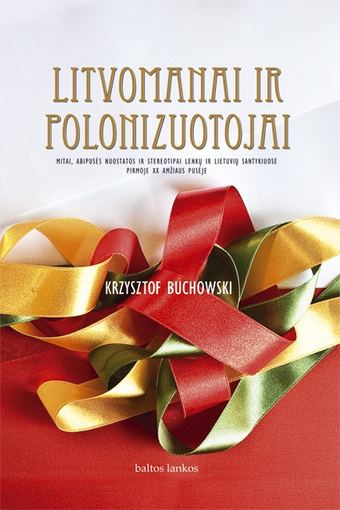43-year-old Krzystof Buchowski, a younger-generation Polish historian from Bialystok University, extensively studied the origins of such myths, their development, and the influence they exerted on the Lithuanian-Polish relations throughout the 20th century. His book “Litwomani and Polonizers. Myths, Mutual Perceptions, and Stereotypes in Polish-Lithuanian Relations in the First Half of the 20th Century” ("Litwomani i polonizatorzy. Mity, wzajemne postrzeganie i stereotypy w stosunkach polsko-litewskich w pierwszej połowie XX wieku") was published several years ago and has now been translated into Lithuanian (by Irena Aleksaitė).
Many of the stereotypes still prevalent today emerged in late 19th-early 20th century, alongside the Lithuanian national movement that was regarded by Polish-speakers, in Lithuania as well as Poland, with surprise at first and, later, resentment and indignation.
The Polish intelligentsia and society were positively shocked when they learned of the Lithuanians' desire to establish their language in the public discourse and the pulpits, let alone seek an independent state of their own. The Polish elites, educated on the writings of romantic authors like Adam Mickiewicz, Maria Rodziewiczowna, Henryk Sienkiewicz, had a romanticized image of Lithuania, populated in their minds by the Lithuanians who were “younger brethren of the Poles”, reverently accepting the culture spread in Lithuania by the Polish-speaking court.
In the 19th century, Poles felt greatly sympathetic towards Lithuanians, remembering as they did the Polish-Lithuanian Commonwealth, battles they fought side by side against Moscow, insurrections against the tsarist rule. The Poles, whose knowledge about Lithuania – and also about the Belarusians and the Ukrainians – came predominantly from literary fiction, were convinced that they knew all there was to know about the Lithuanians and their aspirations.
 |
| K.Buchowski's "Litwomani and Polonizers" |
Even a man of the stature of Boleslaw Prus, the giant of the Polish literature, thought that “any Pole of at least some education has no business in going to Lithuania in order to know it. He knows it almost from childhood, even before that, from a time before his existence.”
Offspring of noble families, who lived in Lithuania and identified themselves as Lithuanian, went to schools in the Russian Empire together with children of Lithuanian peasants and were much surprised that the latter had quite different ideas about history and especially the Union of Lublin (a key treaty in the creation of the Polish-Lithuanian Commonwealth).
Peasant children, much like offspring of Polish-speaking Lithuanian nobility, read and admired Polish literature, but rather different parts of it. Instead of studying “Pan Tadeush” by Mickiewicz or Sienkiewicz's trilogy, they went for Teodor Narbutt's or Adam Honor Kirkor's oeuvre and Jozef Ignacy Kraszewski, who described Lithuanian struggles with Teutonic knights, who mythologized Vytautas the Great, denounced the Union of Lublin. They also read Simonas Daukantas, the first romantic historian to write in Lithuanian.
Among people supporting the idea of a Lithuanian nation state were not only children of peasants, like Vincas Kudirka or Jonas Basanavičius, but many of the Polish-speaking Lithuanian nobility.
The majority of noblemen, however, rejected the plea to embrace the Lithuanian – and largely peasant – culture and were therefore ostracised by the more nationalistically-minded. They were called renegades, traitors, scoundrels. Polish-speaking but Lithuanian-identified noblemen, in their turn, called Lithuanian nationalists 'litwomani'. In Poland and Polish-dominated Vilnius region, litwomani were seen as sort of lunatics who sprung up, as it were, due to foreign influences on the social body of Lithuania. They were called “Polish renegades who consciously turned away from the Polish culture and language.”
Of Poland's political organizations, it was the Polish socialists who regarded the Lithuanian national movement most favourably and at least theoretically acknowledged the Lithuanian's right to self-determination. The biggest socialist of all was Juzef Pilsudski, that descendant of the Lithuanian nobility who did not miss a chance to stress the fact. Pilsudski had great respect for Lithuanians – he thought himself one of them – yet he opposed their political self-determination, let alone ceding Vilnius to Lithuania.
On the other hand, Pilsudski always resisted calls from Polish nationalists to take Kaunas by force and solve the “Lithuanian question” thus. He favoured a federation dominated, politically and culturally, by Poland. On the whole, the early-20th-century Polish elites thought the Lithuanians – but also Belarusians and Ukrainians – to be nations not mature enough to have their own states.
Developments in Lithuania were by no means an isolated case in Europe. As Buchowski aptly notes, “nationalism and revolutionary movements reigned over souls throughout the early 20th century”. Similar tensions existed between Germans and Czechs, Swedes and Finns, Swedes and Norwegians, the Baltic Germans and Estonians and Latvians, between Englishmen and Irishmen.
During World War One, when Lithuania was occupied by Germany, the latter, to great surprise of the Poles of Vilnius, supported the goal of establishing a Lithuanian state with the capital city in Vilnius. According to contemporary census, the share of Lithuanian-speaking population in the town was two to three percent.
This was happening as Germany was moving inexorably towards defeat and wanted to secure its interests of a weakened Poland and Lithuania as a buffer state between itself and Russia. As it happened, German interests resonated with the Lithuanian ones. Germany's support in weapons and financial loans played a crucial role in resisting the Red Army and fighting Poles in the Suvalkai Triangle.
Of Poland's political organizations, it was the Polish socialists who regarded the Lithuanian national movement most favourably and at least theoretically acknowledged the Lithuanian's right to self-determination.
The Polish-Lithuanian resentment intensified in the years of the war and turned into pronounced enmity after bloody battle for Sejny and Lucjan Želigowski's march on Vilnius in 1920.
These resentments proved to be most enduring in places where actual battles took place, the Suvalkai Triangle and Vilnius region, where they are still felt today. Elsewhere in Poland, the dispute did not leave a lasting imprint on the national consciousness.
Lithuania refused to acknowledge Poland's annexation of Vilnius. For Lithuanians, the town was a symbol of the past glory, the historic capital of the Lithuanian state. According to interwar President Antanas Smetona, Lithuanians could not imagine their homeland without Vilnius. That is probably why, in the interwar republic, the issue of Vilnius bordered on a “religious cult”.
On the other hand, the events and military conflicts of 19919-1922 did result in a shift in the Polish national consciousness. The majority of the Polish society eventually “started treating Lithuania as an independent separate state.”
In the period between the wars, both sides engaged in a fierce propaganda war that lasted until the Polish ultimatum to Lithuania on 17 March 1938. The border between Poland and Lithuania was completely sealed off, roads dug up, railways dismantled, all communication by post or telephone banned. In Lithuania, one could get fined for bringing in Polish books or watching Polish films. Lithuanian citizens were issued passports bearing the inscription “Valid in all states except Poland.” Lithuanians had little idea of what was happening in Poland, while the Polish society knew even less about Lithuania.
After Lithuania reluctantly accepted the ultimatum (to establish diplomatic relations with Poland, thus implicitly renouncing any claims to Vilnius) and the two countries exchanged diplomatic representations, appointing Jurgis Šaulys, signatory of the 1918 Independence Act and advocate of cooperation with Poland, as Lithuania's ambassador, relations improved somewhat. The ambassador's personal attitudes helped ease the tension.
World War Two, however, brought a new round of Lithuanian-Polish confrontation in Nazi-occupied Lithuania. Poland regarded Lithuanians as German collaborators, while Lithuanians were quite tough on Poles in Vilnius region. (The Soviet Union, having invaded Poland in 1939, handed Vilnius over to Lithuania.)
Michal Römer (Mykolas Romeris) described his impressions in Vilnius on 9 July 1941: “Anti-Polish sentiment, always strong among Lithuanians, grows every day. Lithuanian policemen, activists, youth, and women in particular boil with hatred towards Poles, offend them at every chance, look down on them with scorn, think themselves more privileged.”
Further on, Römer notes that “Anti-Lithuanian sentiment among the Poles of Vilnius is so radical that they blame Lithuanians for everything bad that happens to them. Meanwhile Germans are playing a double game, telling one thing to one side and something different to the other.”
Eventually, it was the Soviets who settled the dispute over Vilnius once and for all, by occupying all the Baltic states. They conserved and at times even fuelled the old conflicts.
The communist administration of Lithuania was not interested in preserving Polish-language education, but “Moscow decided otherwise.” The Soviet government very consciously “divided and conquered”, a tactic that paid dividends. Lithuania's national communists began pushing out Polish-language schools in the 1950s.
However, closed Polish schools were not replaced by Lithuanian ones but rather by Russian-language schools. As a result, Lithuania's Polish-speaking citizens began seeing the occupying regime as their ally in the fight against Lithuanian dictates.
After the collapse of the Soviet Union, Lithuanians and Poles had to re-examine the situation and normalize relations between their respective states. But even signing an agreement was no easy task.
Foreign Affairs Ministries of both states were to negotiate a Friendship Treaty, but the talks hopelessly stuck due to different approaches both sides had towards history. In order to resolve the stalemate, Lithuanian president at the time, Algirdas Brazauskas, suggested the negotiations be handled by the presidents. Poland agreed and the two countries finally signed the Friendship Treaty in 1994, effectively normalizing Lithuanian-Polish relations.
After the signing of the treaty, even Lithuanian intelligentsia changed their attitudes towards Poland. Poland's first ambassador to post-Soviet Vilnius, Jan Widacki, describes the thaw in his memoirs. Before the treaty, he notes, some Lithuanians seemed to be afraid to accept the ambassador's invitation to visit the embassy in Vilnius. Afterwards, they would accept invitations readily.












